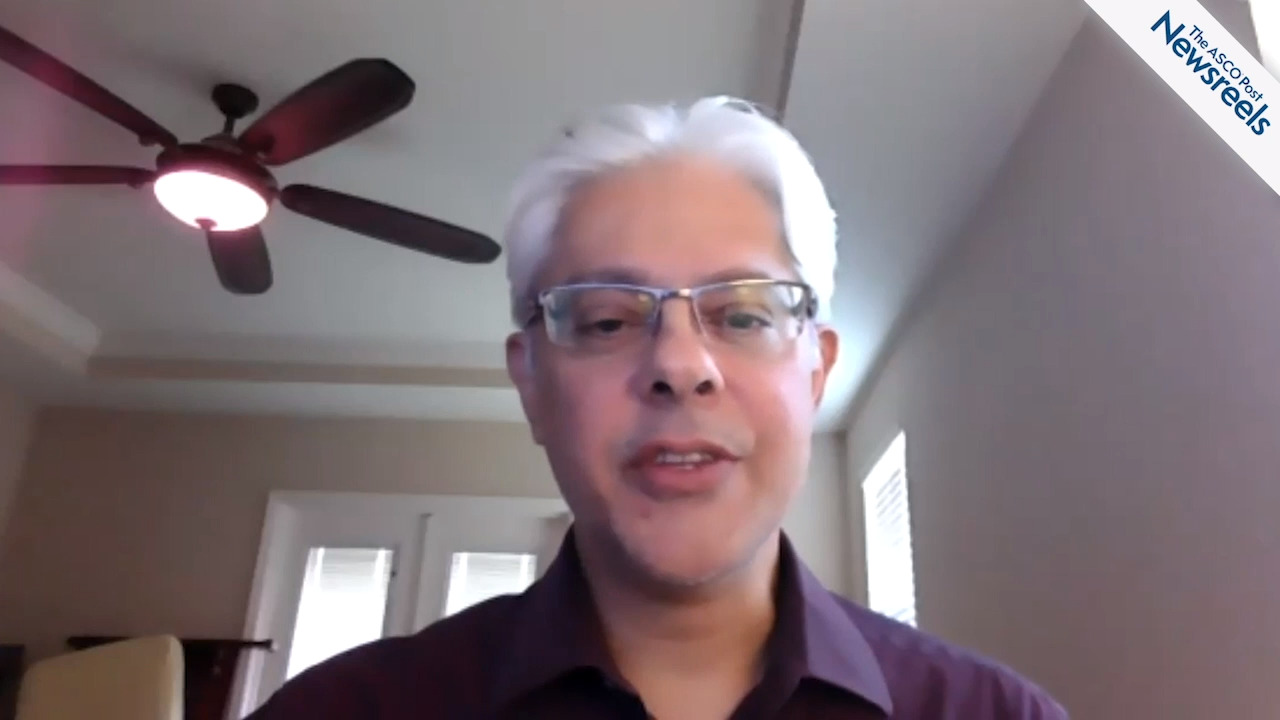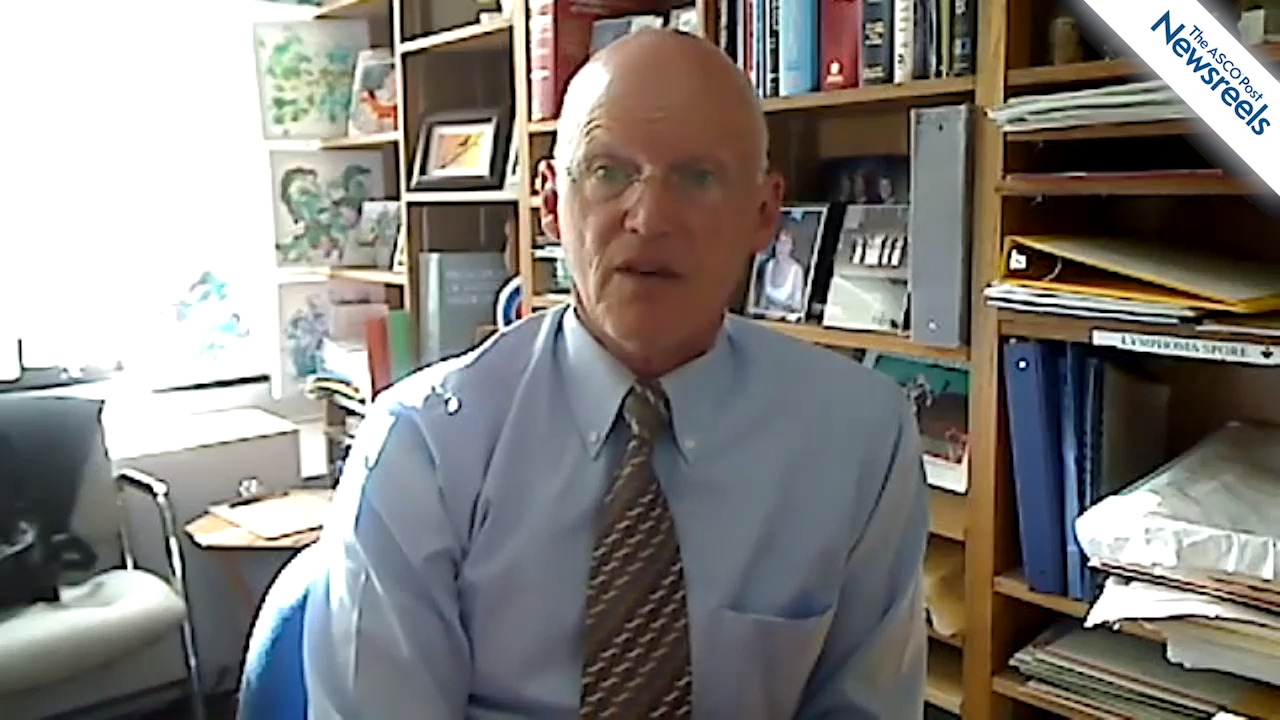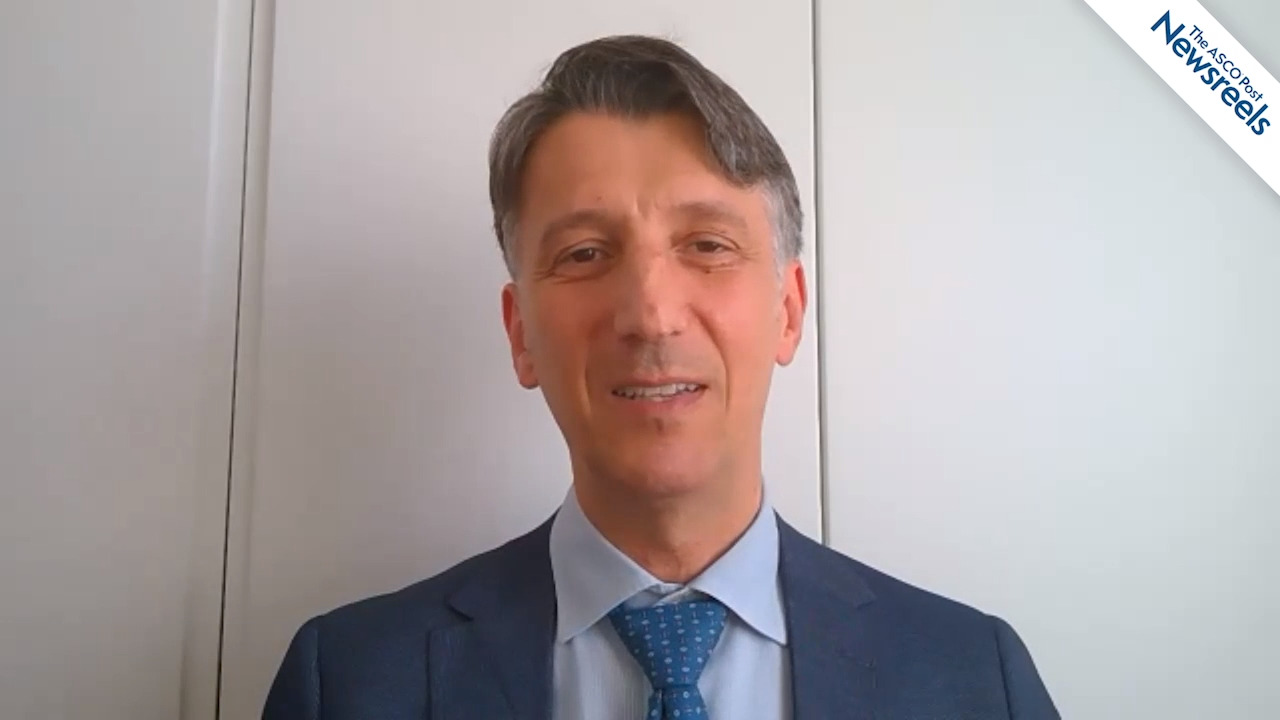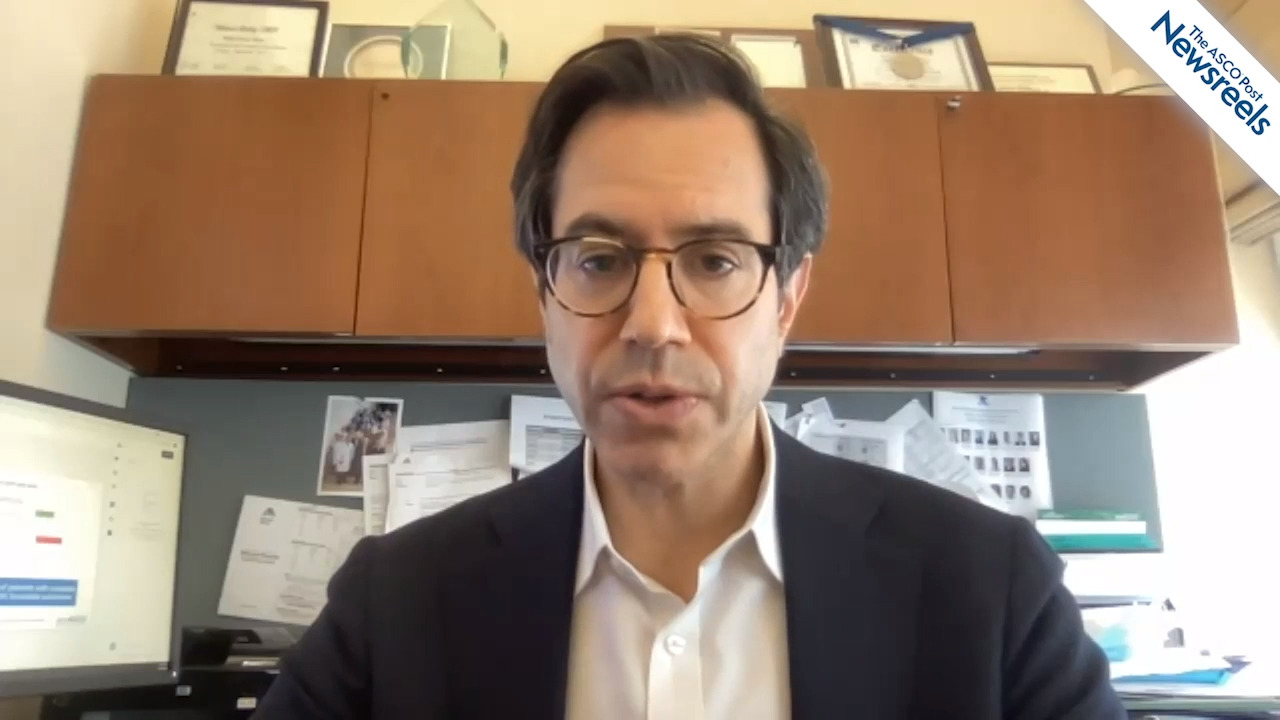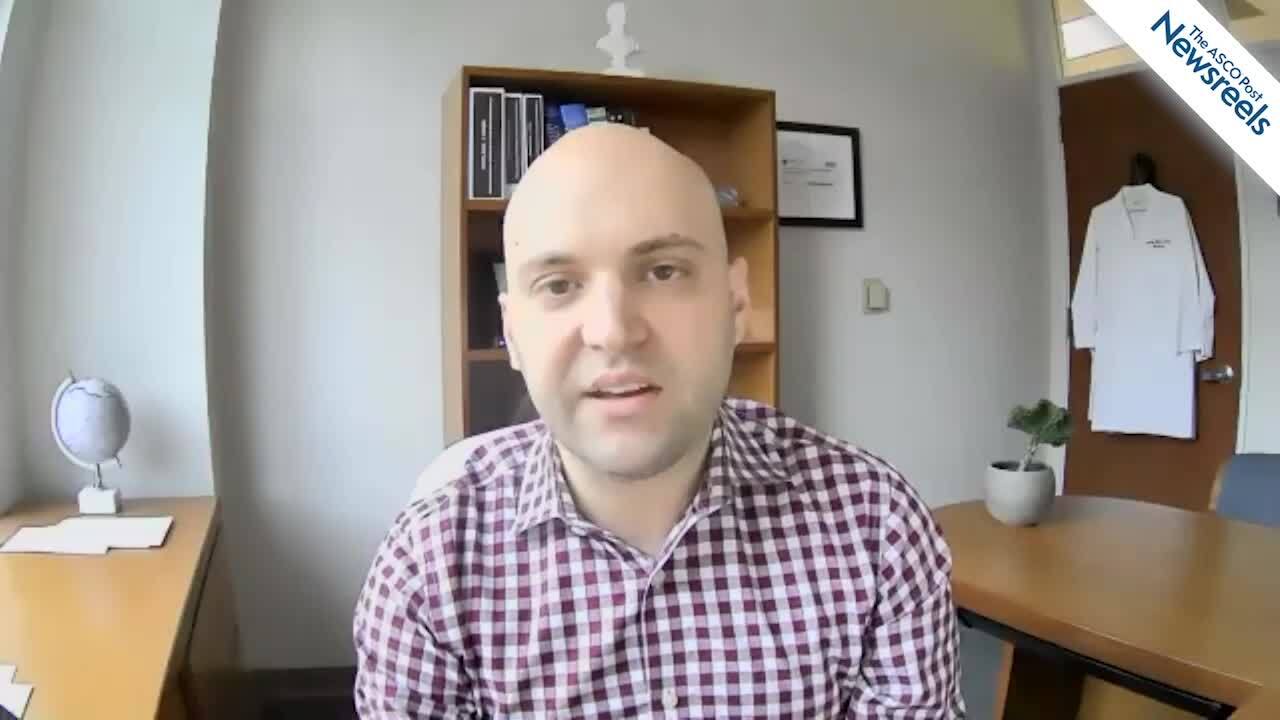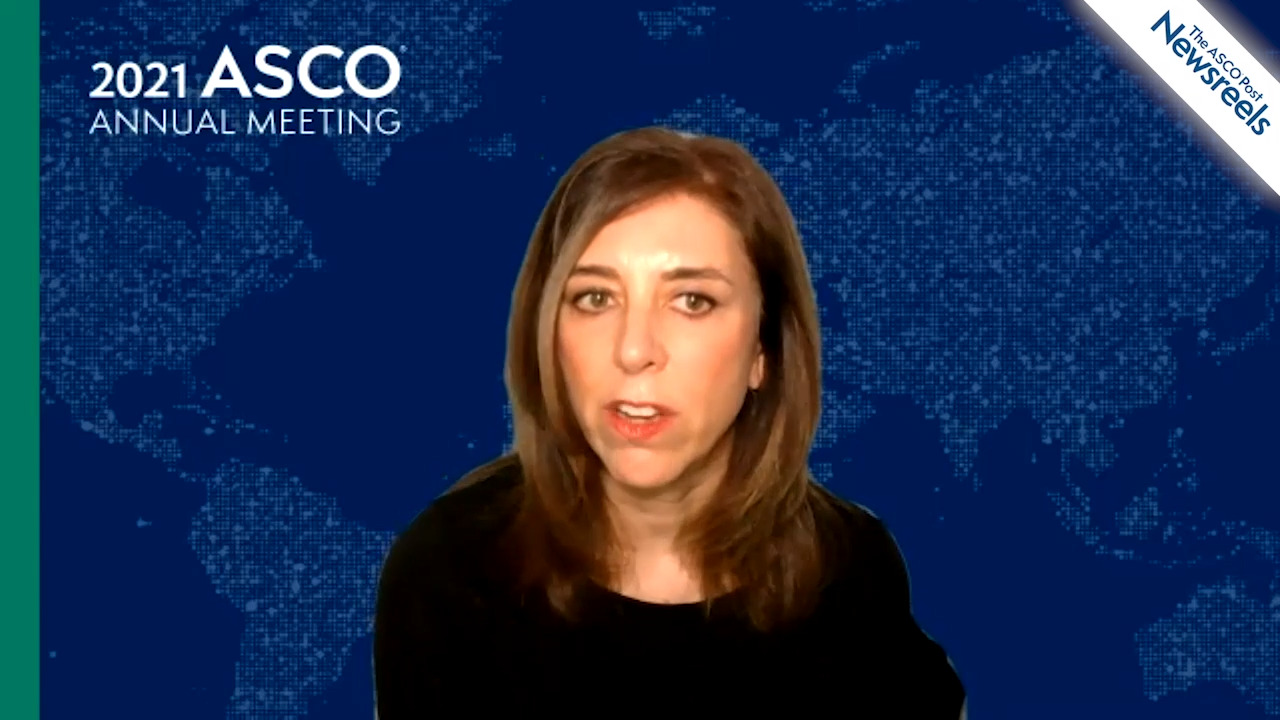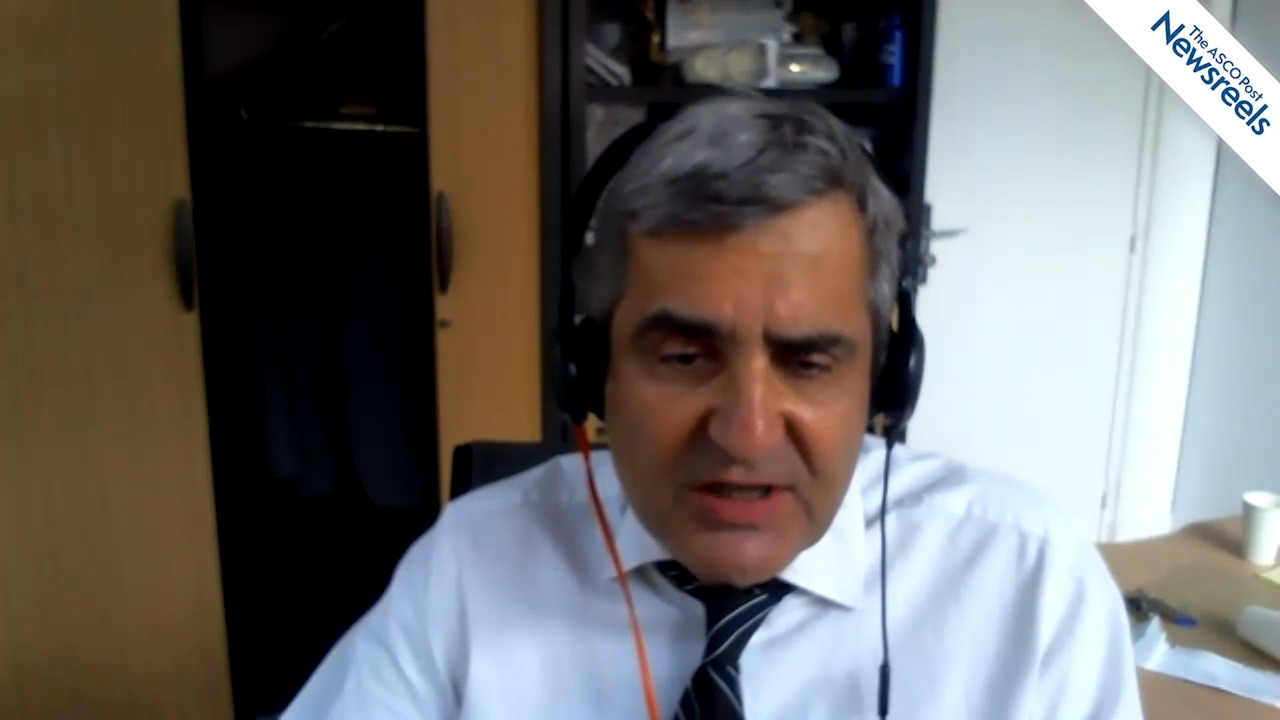2021 ASCO Annual Meeting
Small Study Suggests ALK Targeting May Be of Benefit in Adult Neuroblastoma
Targeting mutations appears to be bearing fruit in the treatment of some difficult-to-treat tumors. For instance, in one study of adult-onset neuroblastoma, targeting ALK mutations in ALK-positive tum...
Early-Phase Trial Finds Mirvetuximab Soravtansine Plus Bevacizumab Active in Recurrent Ovarian Cancer
In patients with recurrent ovarian cancer, the antibody-drug conjugate mirvetuximab soravtansine, given with bevacizumab, showed antitumor activity leading to durable responses in platinum-agnostic pa...
Expert Point of View: Carol Aghajanian, MD
“The phase III ENGOT/GCIG study1 proved to be negative, with no advantage seen with the extension of bevacizumab treatment,” said the abstract’s invited discussant, Carol Aghajanian, MD, Chief of the ...
Bevacizumab in Advanced Ovarian Cancer: Phase III Trial Finds More Is Not Better
In advanced ovarian cancer, the duration of maintenance bevacizumab should remain 15 months, according to the European multicenter phase III ENGOT/GCIG trial. These results were presented during the 2...
Terry P. Mamounas, MD, MPH, on Breast Cancer: Extended Aromatase Inhibitor Therapy
Terry P. Mamounas, MD, MPH, of the University of Florida Health Cancer Center, discusses results from the NRG Oncology/NSABP B-42 study, which examined the Breast Cancer Index and its ability to predi...
Melinda L. Telli, MD, on Breast Cancer: Neoadjuvant Talazoparib for Early HER2-Negative Disease
Melinda L. Telli, MD, of Stanford University, discusses results of a phase II study on neoadjuvant talazoparib in germline BRCA1/2 mutation–positive, early HER2-negative breast cancer. In this setting...
Expert Point of View: Jason J. Luke, MD
The invited discussant of LEAP-004, Jason J. Luke, MD, Associate Professor of Medicine and Director of the Cancer Immunotherapeutics Center, University of Pittsburgh Hillman Cancer Center, said the i...
LEAP-004 Trial Update on Lenvatinib Plus Pembrolizumab After Disease Progression in Metastatic Melanoma
Longer follow-up of the LEAP-004 trial in metastatic melanoma upheld the benefit seen with the VEGF kinase inhibitor lenvatinib plus the PD-1 inhibitor pembrolizumab for patients experiencing disease ...
Expert Point of View: Mary-Ellen Taplin, MD
Invited discussant of the VISION trial, Mary-Ellen Taplin, MD, of Dana-Farber Cancer Institute, Boston, commented on the study, noting that she was a co-investigator of the trial. “Patients with metas...
VISION Trial: Novel PSMA-Targeted Radiotherapy Improves Outcomes in Metastatic Prostate Cancer
Lutetium-177–PSMA-617 (LuPSMA)—an investigational radiolabeled small molecule—significantly improved radiographic progression-free survival and overall survival when added to the standard of care comp...
Expert Point of View: Melinda Telli, MD
EA1131 study discussant, Melinda Telli, MD, Associate Professor of Medicine at Stanford University, Director of the Breast Cancer Program at the Stanford Cancer Institute, and Associate Director of th...
EA1131 Trial: Platinum Not Equal to Capecitabine for Residual Disease in Triple-Negative Breast Cancer
In patients with triple-negative breast cancer who have residual disease after neoadjuvant chemotherapy, adjuvant capecitabine remains the standard of care. In the multicenter randomized noninferiorit...
Expert Point of View: Nicolas Girard, MD, PhD
Invited discussant Nicolas Girard, MD, PhD, of the Curie Institute, Paris, said, “A major challenge in NSCLC is what happens when osimertinib resistance develops.” “A key takeaway point from this stu...
Amivantamab/Lazertinib Combination May Overcome Osimertinib Resistance in Patients With EGFR-Positive NSCLC
Combination targeting of epidermal growth factor receptor (EGFR) with amivantamab/lazertinib achieved durable responses in more than one-third of chemotherapy-naive patients with EGFR-mutant non–small...
Expert Point of View: Jacqueline C. Barrientos, MD
The invited discussant of the phase I trial of lisaftoclax (APG-2575), Jacqueline C. Barrientos, MD, of Hofstra/Northwell, Great Neck, New York, commented on the positive findings: “The 15 patients wi...
Novel BCL2 Inhibitor Shows Activity in CLL in Phase I Trial
The novel, selective BCL2 inhibitor lisaftoclax (APG-2575) has shown activity in the treatment of relapsed or refractory chronic lymphocytic leukemia (CLL) in a phase I study reported at the 2021 ASCO...
Expert Point of View: Jacqueline C. Barrientos, MD, MS
Invited discussant Jacqueline C. Barrientos, MD, MS, of Northwell Health Cancer Institute, Zucker School of Medicine at Hofstra/Northwell in Great Neck, New York, noted that, although both ibrutinib a...
Fixed-Dose, First-Line Ibrutinib/Venetoclax Combination Achieves Durable Remissions in CLL
The combination of fixed-duration, first-line treatment with ibrutinib plus venetoclax achieved complete responses in more than half of patients with chronic lymphocytic leukemia (CLL)/small lymphocyt...
Expert Point of View: Jason J. Luke, MD
Invited discussant of the C-144-01 study,1 Jason J. Luke, MD, Associate Professor of Medicine and Director of the Cancer Immunotherapeutics Center, University of Pittsburgh Hillman Cancer Center, Pitt...
Lifileucel After Disease Progression in Metastatic Melanoma: Durable Responses Achieved in Phase II Trial
Despite the fact that we have made significant progress in metastatic melanoma with immune checkpoint inhibitors—now the standard of care—most patients experience disease progression and are left with...
ADAPT Trial: ‘Excellent’ Outcomes Reported With Neoadjuvant Dual HER2 Therapy in Breast Cancer
The first overall survival analysis of the WGS-ADAPT HER2+/HR– study, which evaluated neoadjuvant therapy in patients with hormone receptor–negative, HER2-positive disease, showed that treatment with ...
CheckMate 648: First-Line Nivolumab Regimens Improve Survival in Esophageal Squamous Cell Carcinoma
As first-line treatment of advanced esophageal squamous cell carcinoma, nivolumab-containing regimens improved overall survival over standard-of-care chemotherapy, according to the first results of th...
OUTBACK: No Benefit for Adjuvant Chemotherapy in Cervical Cancer
In women with locally advanced cervical cancer, adjuvant chemotherapy adds no benefit to standard cisplatin-based chemoradiation, results of the international phase III OUTBACK study have shown,1 as r...
KEYNOTE-564: Adjuvant Pembrolizumab Extends Disease-Free Survival in High-Risk Renal Cell Carcinoma
Adjuvant pembrolizumab following surgery significantly improved disease-free survival compared with placebo among patients with high-risk clear cell renal cell carcinoma (RCC), according to the intern...
Sotorasib: Subgroup Analysis of Phase II Trial Shows Activity With Breakthrough KRAS Inhibitor in Lung Cancer
The breakthrough KRAS-specific inhibitor sotorasib achieved responses in patients with KRAS G12C–mutated non–small lung cancer (NSCLC) who had experienced disease progression on platinum-based chemoth...
OlympiA Trial: Adjuvant Olaparib Extends Disease-Free Survival in BRCA-Mutated Early Breast Cancer
Adjuvant therapy with the PARP inhibitor olaparib for 1 year extended disease-free survival in patients with high-risk early-stage HER2-negative breast cancer with BRCA1/2 germline (inherited) mutatio...
Neeraj Agarwal, MD, on Treatment Patterns and Disparities in Patients With Prostate Cancer
Neeraj Agarwal, MD, of Huntsman Cancer Institute at the University of Utah, discusses three studies that examined real-world treatment patterns and utilization of advanced therapies in men with metast...
Bijal D. Shah, MD, on CLL: CAR T-Cell Therapy With Brexucabtagene Autoleucel
Bijal D. Shah, MD, of the H. Lee Moffitt Cancer Center, discusses phase II results of the ZUMA-3 study, which evaluated brexucabtagene autoleucel (KTE-X19), an anti-CD19 CAR T-cell therapy, in adults ...
Martin Reck, MD, PhD, on NSCLC: Nivolumab, Ipilimumab, and Chemotherapy for Advanced Disease
Martin Reck, MD, PhD, of LungenClinic, discusses a 2-year update of the CheckMate 9LA study, which sought to determine whether nivolumab plus ipilimumab combined with two cycles of chemotherapy is mor...
Priya Rastogi, MD, on Breast Cancer: Predicting the Benefit of Extended Letrozole Therapy
Priya Rastogi, MD, of the University of Pittsburgh, discusses results from the NRG Oncology/NSABP B-42 trial, which evaluated the utility of the 70-gene MammaPrint assay in predicting the benefit of e...
Peter H. O’Donnell, MD, on Urothelial Cancer: First-Line Pembrolizumab in Cisplatin-Ineligible Patients
Peter H. O’Donnell, MD, of The University of Chicago, discusses response and survival results from the phase II KEYNOTE-052 study, which showed that after up to 5 years of follow-up, pembrolizumab con...
Brian K. Link, MD, on Mantle Cell Lymphoma: Expert Perspective on Treatments Now and Those to Come
Brian K. Link, MD, of the University of Iowa Carver College of Medicine, reviews three abstracts on state-of-the-art therapies for mantle cell lymphoma: bendamustine, rituximab, lenalidomide and borte...
Paolo Ghia, MD, PhD, on CLL/SLL and Ibrutinib Plus Venetoclax: A Primary Analysis of the CAPTIVATE Trial
Paolo Ghia, MD, PhD, of the Università Vita-Salute San Raffaele, discusses phase II results from the CAPTIVATE study, which examined ibrutinib plus venetoclax as a fixed-duration first-line treatment ...
Matt D. Galsky, MD, on Bladder Cancer: Neoadjuvant Therapy With Gemcitabine, Cisplatin, and Nivolumab
Matt D. Galsky, MD, of the Tisch Cancer Institute at Icahn School of Medicine at Mount Sinai, discusses results from a phase II trial designed to test gemcitabine and cisplatin plus nivolumab as neoad...
Neeraj Agarwal, MD, on Prostate Cancer: Androgen-Deprivation Therapy With Orteronel or Bicalutamide
Neeraj Agarwal, MD, of Huntsman Cancer Institute at the University of Utah, discusses phase III data from the SWOG S1216 trial, which evaluated the clinical benefit of using androgen-deprivation thera...
Sibylle Loibl, MD, PhD, on Triple-Negative Breast Cancer: Improving Long-Term Outcomes With Durvalumab
Sibylle Loibl, MD, PhD, of the German Breast Group, discusses results from the phase III GeparNUEVO study, which investigated neoadjuvant durvalumab in addition to anthracycline/taxane-based neoadjuva...
Peter C. Black, MD, on Prostate Cancer Health-Care Disparities: Expert Perspective
Peter C. Black, MD, of the Vancouver Prostate Centre, University of British Columbia, reviews three studies on early detection and treatment of Black patients with prostate cancer: a large-scale analy...
Novel Monoclonal Antibody Emerges as Potential First-Line Standard in Nasopharyngeal Cancer
A new first-line standard of care may be emerging for recurrent or metastatic nasopharyngeal carcinoma, based on the findings of the global phase III JUPITER-02 trial presented at the 2021 ASCO Annual...
Geoffrey J. Lindeman, MBBS, PhD, on Breast Cancer: Venetoclax and Fulvestrant in ER-Positive, HER2-Negative Disease
Geoffrey J. Lindeman, MBBS, PhD, of Peter MacCallum Cancer Centre, discusses results from the phase II VERONICA study, which compared venetoclax plus fulvestrant with fulvestrant alone in women with ...
Nicholas J. Short, MD, on ALL: Ponatinib Plus Blinatumomab May Help Patients Avoid Transplants
Nicholas J. Short, MD, of The University of Texas MD Anderson Cancer Center, discusses early results from a phase II study which showed that combining ponatinib and blinatumomab in patients with Phila...
Ann S. LaCasce, MD, on Hodgkin Lymphoma: PET-Adapted Therapy for Bulky Disease
Ann S. LaCasce, MD, of Dana-Farber Cancer Institute, discusses results from the CALGB 50801 Alliance study, which showed that a PET scan–adapted approach may reduce the need for radiation treatment an...
Nadia Harbeck, MD, PhD, on Luminal Breast Cancer: Prognostic Impact of Recurrence Score, Endocrine Response, and Other Factors
Nadia Harbeck, MD, PhD, of Ludwig Maximilian University of Munich, discusses first phase III results from a prospective high-risk cohort of patients with luminal breast cancer, which showed a good pro...
Sumanta K. Pal, MD, on Urothelial Carcinoma: Comparing Cisplatin and Gemcitabine With or Without Berzosertib
Sumanta K. Pal, MD, of City of Hope, discusses results from a phase II study that sought to determine whether adding berzosertib, a selective ATR inhibitor, to the standard upfront chemotherapy regime...
Atezolizumab Reduces Risk of Disease Progression in Patients With PD-L1–Expressing Early-Stage NSCLC
Atezolizumab given after chemotherapy to patients with resected stage II to IIIA non–small cell lung cancer (NSCLC) significantly improved disease-free survival compared with best supportive care alon...
Cathy Eng, MD, on Colorectal Cancer: FOLFOXIRI, Cetuximab, and Bevacizumab as First-Line Treatment
Cathy Eng, MD, of Vanderbilt-Ingram Cancer Center, discusses two abstracts from a session she co-chaired: the phase II DEEPER trial, which explored the use of FOLFOXIRI plus cetuximab vs FOLFOXIRI plu...
Thierry André, MD, on Pembrolizumab vs Chemotherapy in MSI-High Colorectal Cancer
Thierry André, MD, of Hôpital Saint-Antoine, discusses final overall survival data for the phase III KEYNOTE-177 study, which confirmed pembrolizumab as a new standard of care for first-line treatment...
Nadia Harbeck, MD, PhD, on Early Breast Cancer: Benefit of a De-escalated Regimen
Nadia Harbeck, MD, PhD, of Ludwig Maximilian University of Munich, discusses results from the ADAPT HR–/HER2+ trial, which showed, for the first time, improved pathologic complete response and surviva...
Expert Point of View: Christine Lovly, MD, PhD
Invited discussant Christine Lovly, MD, PhD, Associate Professor of Medicine, Ingram Associate Professor of Cancer Research, Vanderbilt University Ingram Cancer Center, Nashville, discussed progress i...
More Widespread Biomarker Testing for NSCLC in Oncology Practices and More Testing in Black Patients: An Urgent Priority
Even though next-generation sequencing is recommended by the National Comprehensive Cancer Network (NCCN) for biomarker testing for patients with non–small cell lung cancer (NSCLC), the uptake among c...
Choice of First-Line Platinum Chemotherapy Does Not Significantly Impact Efficacy of Second-Line Immunotherapy in Advanced Urothelial Carcinoma
In a presentation of real-world data given during the 2021 ASCO Annual Meeting, Miron et al concluded that the choice of first-line platinum chemotherapy did not result in a significant difference in ...



